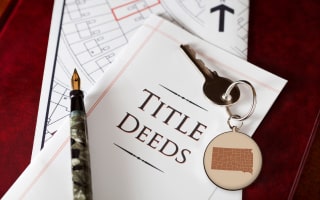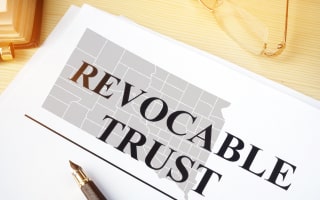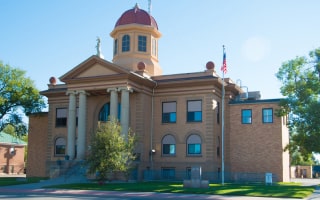How to Find Owners of Properties
in South Dakota

Property ownership in South Dakota is regulated by Chapter 43-2 of state laws. Parts 10-17 of Chapter 43-2 define the types of property ownership that are allowed in the state. Along with sole ownership of a property, South Dakota also allows multiple people to own a home in the form of a joint tenancy or partnership. You can also form a limited liability company (LLC) to gain ownership of a property.
Real estate records in South Dakota are required to be made available to the public under 1-27 of South Dakota law. If you're interested in accessing ownership records for real estate in South Dakota, there are many avenues available to you. However, while it may be easy to identify the individual owner of a property, it's more difficult to do so when the property is controlled by a corporation or trust.
How Do You Find Owners of a Property in South Dakota?

If you want to find owners in South Dakota, there are several methods you can use, which include everything from accessing public records at the county recorder's office to using online resources. Depending on which entity owns the property, the process may require a considerable amount of research. The steps for finding owners of a specific property are detailed below.
Registry of Deeds
A registry of deeds is a place where documents are recorded in physical books. Each county has a register of deeds office that you can visit if you need to access the property records that are stored there.
The types of information that are recorded in a registry of deeds include real estate contracts, liens and encumbrances, and mortgages. The deeds for all properties in the county will also be recorded there. To search these records, you may need an address or the parcel ID. Since these documents are available to the public, you can access the South Dakota Registry of Deeds through the following county websites:
Land Records Website
Land records have existed in the U.S. for hundreds of years. When colonists first settled in the country, they created these documents to provide proof of ownership. In South Dakota, these documents are available at the Register of Deeds office.
You may need to visit a local office to obtain the documents in question. Use the Department of Revenue's Register of Deeds website to discover which documents are recorded and how you can gain access to them. Some counties provide online databases that make it easier to find the documents you're looking for.
City or Town Assessor's Office
The local assessor's office holds many different types of records, which include everything from property records to tax bills. If you're interested in these records, you can visit the county assessor's office to request the documents and uncover the property's owner. The assessor's offices for the 10 most populous counties in South Dakota are linked below:
- Minnehaha County
- Pennington County
- Lincoln County
- Brown County
- Brookings County
- Meade County
- Codington County
- Lawrence County
- Yankton County
- Davison County
Tax Records
Property tax records are also maintained by the local assessor's office. The types of information that you might find on these records include the following:
- Property owner names
- Legal description
- Property address
- Renovation details
- Assessed and market valuations
- Recent tax payments
- Sales history
To request a property tax record, visit your county's equalization website. Most counties provide a property records database that gives you access to this info.
Title Company/Agency
Title companies are firms that can verify that the seller of a home is legally able to complete this transaction. If someone else has a claim to the property, a title company can find out. These firms have access to comprehensive databases of property records and offer title searches as a service that allows you to access ownership history and information. The average cost of a title search in South Dakota ranges from $75-$200.
You can also use other means of determining who the property owner is. For example, a neighbor could inform you of the owner's name. You could also ask local real estate lawyers or agents if they know who the owner is. Consider navigating to real estate websites that offer property ownership information.
![]() Online Services
Online Services
You can also obtain comprehensive property records from third-party real estate sites. While these records aren't as extensive as official ones, they should provide you with most of the property ownership information you're interested in.
For example, PropertyChecker.com gives you numerous search options and access to a wide range of different records and documents. You can use these records to find current and past owners. You'll also be able to uncover the people behind trusts or entities.
To use this tool, enter the owner's name, phone number, or email. You can also input the property address or parcel ID. Once you perform this search, you'll receive the following documents:
- Deed records
- Property owner names
- Lien records
- Loan records
- Neighborhood data, which includes recent crime statistics
- Building permits
- Foreclosure records
- Property tax records
- Details about the property
- Sales history
What Are the Different Types of Property Ownership in South Dakota?

If you're buying a property in South Dakota on your own, ownership of the home can be simple. However, property ownership can also be a collective term that describes joint owners, business entities, couples, or families. When you own a property in South Dakota, you have access to certain legal and financial benefits depending on the arrangement.
Understanding the various types of property ownership can help you make an informed decision on holding the title. Choosing the right ownership structure for your property or portfolio can influence factors like your risk, taxes, liability, and access to finance. There are several types of property ownership in South Dakota, each of which has its own implications and benefits. The most common ownership types in South Dakota include the following:
- Sole ownership
- Joint tenancy
- Tenancy in common
Here's a closer look at each ownership type:
-
Sole Ownership: One individual maintains complete rights to the property. Full control over the property and how it's used. Sole liability for any taxes or debts that they accrue.
-
Joint Tenancy: At least two people have equal shares in the property as well as the right of survivorship. Transfer of sale is easy upon death and doesn't require probate. When an owner sells their interest, joint tenancy stops.
-
Tenants by the Entirety: A type of joint tenancy that's meant to be used by married couples. Protects from creditors. Both spouses must agree with any property decision.
-
Community Property: The property is purchased by both spouses, which means that each partner equally owns the property. Equal rights to sell, manage, and use the property. If the couple divorces, the property must be divided equally.
-
Tenancy in Common: At least two owners can hold unequal or equal shares without access to survivorship rights. Shares in the property can be inherited or sold independently. Owners may have disputes over how the property is managed or transferred.
-
Condominium Ownership: Multiple individuals buy a unit in a complex and share ownership in the common areas. Individual ownership of personal living space. Must adhere to HOA fees and rules.
-
Cooperative Ownership: Residents have full ownership of the entire property. Allows for lower upfront expenses and better community control. Selling shares requires approval from some of the other members.
-
Trust Ownership: The property is held directly by a trust for any beneficiaries. This structure protects assets from creditors and provides tax benefits. Property management and transfer can be complicated.
-
Life Estate: The buyer retains ownership as long as they're alive, after which it is passed to someone else. Can use the property for your entire life. Transferring or selling your interest in the property requires prior consent from the remainderman.
Finding the Owner of a Trust or Corporation that Owns Properties in South Dakota

Besides an individual owning real estate, properties in South Dakota can be owned by the following entities:
- Trust
- C or S corporation
- Partnership
- Limited liability
An interested person can request the assistance of a title company or real estate attorney to find the owner of a corporation or trust. Keep in mind that determining the owner of any of these entities on your own involves different steps.
For example, you may need to cross-reference public records like deeds and mortgages. You may also be tasked with searching business databases like Westlaw or LexisNexis. Your local chamber of commerce may also provide you with access to the information you seek.
Finding the Owner of a Trust in South Dakota
Finding the owner of a trust in South Dakota requires you to obtain the Certificate of Real Estate Value that was created alongside the trustee's deed. These documents are available at your county's Register of Deeds office.
Finding the Owner of an LLC in South Dakota
To find the owner of an LLC in South Dakota, you can use the South Dakota Secretary of State website, which allows you to search by the name of the company or by its business ID.
Finding the Owner of a Corporation in South Dakota
When you need to find the owner of a corporation in South Dakota, use the same website that allows you to search for LLC info. The Secretary of State's website includes a comprehensive database of company names and public records.
Common Methods of Property Transfer in South Dakota

Property deeds are legal documents that state who owns a piece of land, where the land is located, and what its existing boundaries are. Depending on the type of land that's being described in the document, it might include restrictions that limit how the property can be used.
There are many types of deeds, which include everything from deeds of trust to warranty deeds. South Dakota law mentions that there are numerous types of deeds that a property owner can use to transfer a title.
-
Warranty Deed: Also referred to as a general warranty deed, this document ensures that the current owner is guaranteeing a clear title that isn't subject to undisclosed liens. When using this deed, the owner must agree to defend the buyer's title against any adverse claims that might arise. Keep in mind that this warranty doesn't end.
-
Special Warranty Deed: This is a limited warranty deed that comes with one major difference when compared to a standard warranty deed. The guarantee will only cover title issues that are caused by the actions of the existing owner. If the issue occurred before the current owner held the title, they don't need to address the problem.
-
Quitclaim Deed: This type of deed can come with or without covenants. It's a statutory deed form that offers several restrictions. A quitclaim deed without covenants transfers the piece of real estate with no warranty of title or covenants, which means that there are no promises about the title in the document. All risk belongs to the new owner.
A quitclaim deed with covenants will usually specify that the owner hasn't transferred their home to anyone else and that there aren't any liens or mortgages tied to the property.
Step-by-Step Guide to Property Transfer in South Dakota

If you choose to transfer real estate in South Dakota, you must understand the complex legal and administrative processes involved in the conveyance of a property title. To transfer property ownership officially, you'll first be tasked with determining the type of property transfer.
If you're selling the property to a new owner, it shouldn't be hard to transfer real estate in South Dakota. However, you could decide to place the property in a trust or provide it as a gift to a friend or family member without monetary exchange.
Once you identify the type of transfer you'd like to take part in, you can perform a title search with the assistance of a title company. This search allows you to identify any encumbrances, disputes, or liens related to the title. Make sure you also consider obtaining title insurance, which is required by most lenders.
Before the property can be transferred, a deed must be prepared and signed. This document transfers ownership from the grantor or the grantee. As mentioned previously, you can use different types of warranty deeds or quitclaim deeds to transfer property. To perform a transfer, you must pay a fee of $0.50 for every $500 of the property's sale value.
Once both parties sign the deed in front of a notary public, it will be recorded directly with the recorder of deeds in your county. This process establishes the title for the new owner. You'll receive a receipt of the recorded deed, after which you must update the property records with the local tax assessor's office. Once you take this step, all future bills will be sent to the new owner.
Property Ownership Guide
- How to Find Owners of Properties in South Dakota
- How Do You Find Owners of a Property in South Dakota?
- What Are the Different Types of Property Ownership in South Dakota?
- Finding the Owner of a Trust or Corporation that Owns Properties in South Dakota
- Common Methods of Property Transfer in South Dakota
- Step-by-Step Guide to Property Transfer in South Dakota
South Dakota Homeowner Lookup
- Owner(s)
- Deed Records
- Loans & Liens
- Values
- Taxes
- Building Permits
- Purchase History
- Property Details
- And More!
Property Ownership Guide
- How to Find Owners of Properties in South Dakota
- How Do You Find Owners of a Property in South Dakota?
- What Are the Different Types of Property Ownership in South Dakota?
- Finding the Owner of a Trust or Corporation that Owns Properties in South Dakota
- Common Methods of Property Transfer in South Dakota
- Step-by-Step Guide to Property Transfer in South Dakota